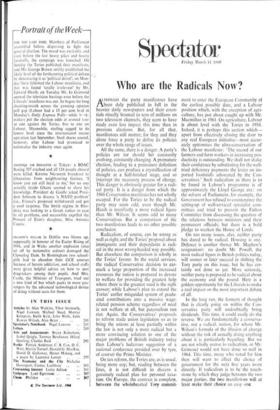Who are the Radicals Now?
ALTHOUGH the party manifestoes have been duly published in full in the heavier daily newspapers and their essen- tials ritually beamed to tens of millions on two television channels, they seem to have Made even less impact this time than in previous elections. But, for all that, manifestoes still matter; for they and they alone force a party to define its policies over the whole range of issues.
All the same, there is a danger. A party's policies are (or should be) constantly evolving, constantly changing. A premature 'election, leading to a premature definition of policies, can produce a crystallisation of thought at a half-finished stage, and so interrupt the necessary process of change. This danger is obviously greater for a radi- cal party. It is a danger from which the 1966 Conservative manifesto has not wholly escaped. For the Tories to be the radical party may seem odd, even though Mr. Heath is manifestly a more radical figure than Mr. Wilson. It seems odd to many Conservatives. But a comparison of the two manifestoes leads to no other possible conclusion.
Radicalism, of course, can be wrong as well as right; and the Tories' proposal about immigrants and their dependants is radi- cal in the most wrong-headed way possible. But elsewhere the comparison is wholly in the Tories' favour. In the social services, the radical Conservative decision to ear- mark a large proportion of the increased resources the nation is prepared to devote to welfare for providing the greatest help where there is the greatest need is the right answer; while Labour's plan to extend the Tories' earlier misguided system of gradu- ated contributions into a massive wage- related pension scheme regardless of need is not welfare at all, but paternalism run riot. Again, the Conservatives' proposals to reform trade union legislation so as to bring the unions at least partially within the law is not only a more radical but a more convincing solution to one of the major problems of British industry today than Labour's ludicrous suggestion of a national conference presided over by (yes, of course) the Prime Minister.
• On tax reform, the Tories are, as is usual, being more coy; but, reading between the lines, it is not difficult to discern a genuinely radical plan for personal taxa- tion. On Europe, the contrast is complete, between the wholehearted Tory commit- ment to enter the European Community at the earliest possible date, and a Labour position which, with the exception of agri- culture, has just about caught up with Mr. Macmillan in 1961. On agriculture, Labour is about level with the Tories in 1958. Indeed, it is perhaps this section which— apart from effectively closing the door to any real European initiative—most accur- ately epitomises the ultra-conservatism of the Labour manifesto: 'The record of our farmers and farm workers in increasing pro- ductivity is outstanding. We shall not shake their confidence by substituting for the well- tried deficiency payments the levies on im- ported foodstuffs advocated by the Con- servatives.' Such radicalism as there is to be found in Labour's programme is of approximately the Lloyd George era : on the reform of Parliament, for example, the Government has refused to countenance the setting-up of well-serviced specialist com- mittees and tried to prevent the Fulton Committee from discussing the question of the relations between ministers and their permanent officials; but there is a bold pledge to weaken the House of Lords.
On too many issues, alas, neither party has dared to be radical. Housing is one. Defence is another (hence Mr. Mayhew's resignation): no doubt Mr. Powell, the most radical figure in British politics today, will sooner or later succeed in shifting the Tory party on this issue, but he has cer- tainly not done so yet. More seriously, neither party is prepared to be radical about the economy and the pound. Here is a golden opportunity for the Liberals to make a real impact on the most important debate of all.
In the long run, the ferment of thought that is clearly going on within the Con- servative party will undoubtedly bring dividends. This time, it could easily do the reverse. We are fundamentally a conserva- tive, not a radical, nation, for whom Mr. Wilson's formula of the illusion of change without the risk of actually doing anything about it is particularly beguiling. But we are not wholly averse to radicalism, or Mr. Grimond would not have done so well in 1964. This time, many who voted for him then will want to affect the choice of government for the next five years more directly. If radicalism is to be the touch- stone by which they judge between the two major parties, the two manifestoes will at least make their choice an easy one.






































 Previous page
Previous page